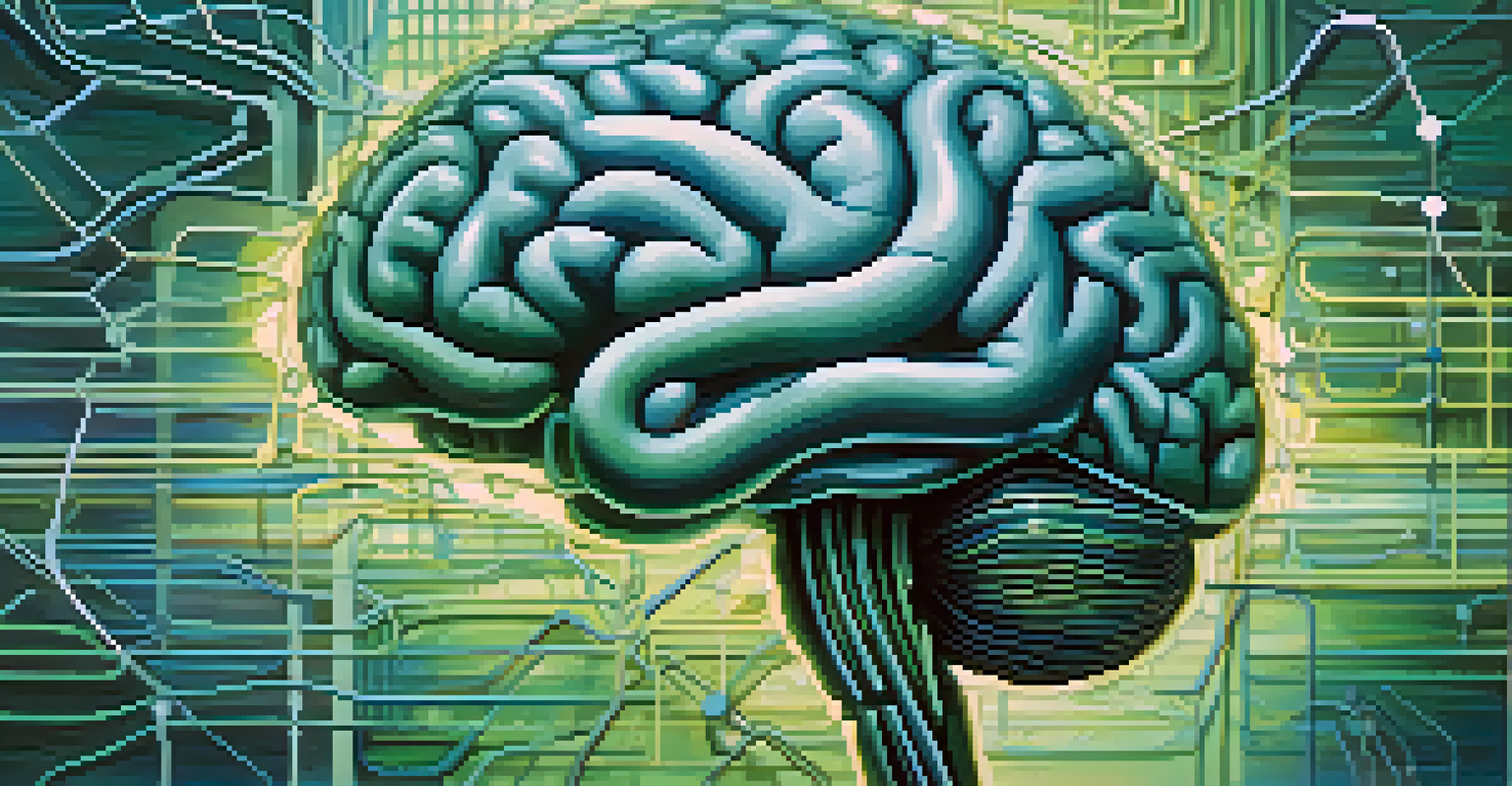The Default Mode Network: Hallucinogens and Self-Perception

Understanding the Default Mode Network (DMN)
The Default Mode Network, or DMN, is a network of brain regions that show heightened activity when we're at rest or not focused on the external environment. Think of it as your brain’s 'background process' that handles self-referential thoughts, daydreaming, and memory retrieval. This network typically activates during introspective tasks, helping us reflect on our past and contemplate our future.
The mind is everything. What you think you become.
Interestingly, the DMN is crucial for our sense of self and personal identity. When we think about ourselves, our lives, and our relationships, the DMN lights up, much like a spotlight illuminating the stage of our consciousness. This makes it a key player in how we perceive ourselves and navigate our social world.
Recent studies have shown that alterations in DMN activity can lead to shifts in self-perception, creating a fascinating link between brain function and our sense of self. Understanding this network can provide insights into various mental health conditions, including depression and anxiety, where self-perception often becomes distorted.
The Role of Hallucinogens in Brain Activity
Hallucinogens, such as psilocybin and LSD, are known for their ability to profoundly alter consciousness and perception. These substances can disrupt the usual functioning of the DMN, leading to a temporary dissolution of the self. Imagine it as a fog rolling in, blurring the lines of your identity and opening your mind to new experiences and ways of thinking.

Research indicates that hallucinogens can reduce connectivity within the DMN, allowing for an enhanced connection with other brain networks. This altered state can facilitate a sense of unity with the environment and a feeling of interconnectedness with others, which contrasts sharply with our everyday sense of individuality.
DMN and Self-Perception Connection
The Default Mode Network (DMN) plays a crucial role in shaping our self-identity and personal perceptions, particularly during introspective thought.
These experiences can lead to significant shifts in self-perception. Users often report feeling less constrained by their usual self-identity, which can foster creativity, empathy, and a renewed appreciation for life. This phenomenon poses intriguing questions about how our perception of self is constructed and how it can be reshaped.
Hallucinogens and Altered Self-Perception
When individuals consume hallucinogens, they may experience a profound alteration in self-perception. Many report a sense of ego dissolution, where the boundaries of the self seem to fade away. Picture standing on the edge of a vast ocean, where your individual identity begins to blend with the water, creating a sense of oneness with everything around you.
We are what we repeatedly do. Excellence, then, is not an act, but a habit.
This shift can lead to transformative experiences, where users gain new insights into their lives and relationships. For some, this can be incredibly healing, allowing them to confront issues they've long avoided, while for others, it may spur anxiety or confusion. The unpredictable nature of these experiences highlights the complexity of self-perception.
Moreover, these altered states can have lasting effects. Many people find that their experiences lead to changes in behavior and outlook long after the effects of the substance have worn off. This raises the question of how temporary shifts in brain activity can lead to more permanent changes in how we view ourselves and our place in the world.
The Therapeutic Potential of Hallucinogens
The therapeutic use of hallucinogens has gained attention in recent years, particularly in treating mental health conditions such as PTSD, depression, and anxiety. By inducing altered states of consciousness, these substances can help patients confront and process traumatic memories, often leading to profound insights about themselves. This therapeutic approach is like peeling back the layers of an onion, revealing deeper truths that were previously hidden.
Studies have shown that patients report lasting changes in their self-perception and overall well-being after guided sessions with hallucinogens. These changes can include a greater sense of connectedness, reduced fear of death, and an improved outlook on life. It’s a powerful reminder of how our perception of self can be reshaped through altered states of consciousness.
Hallucinogens Alter Self-Identity
Hallucinogens can disrupt DMN activity, leading to experiences of ego dissolution and significant shifts in self-perception for users.
However, it’s critical to approach this therapy with caution. The context in which hallucinogens are used—such as supportive environments and professional guidance—can greatly influence outcomes. This underscores the importance of understanding the DMN and self-perception in maximizing the therapeutic potential of these substances.
Scientific Research on DMN and Hallucinogens
In recent years, scientific research has increasingly focused on the relationship between the DMN and hallucinogens. Brain imaging studies reveal that substances like psilocybin can decrease activity within the DMN, leading to a more interconnected brain state. This has sparked interest in how these changes might correlate with the profound subjective experiences reported by users.
Researchers are now exploring the neurobiological mechanisms behind these experiences, aiming to understand how and why hallucinogens can lead to such dramatic changes in self-perception. For instance, some studies suggest that the disruption of DMN connectivity may allow other brain areas to communicate more freely, fostering creativity and novel ideas.
As the field of psychedelic science evolves, these insights could pave the way for new treatments for mental health disorders, emphasizing the importance of understanding the DMN and its role in shaping our sense of self. The potential implications for therapy are immense, but further research is needed to unravel the complexities involved.
Challenges and Considerations in Research
Despite the exciting potential of studying the DMN and hallucinogens, researchers face several challenges. One significant hurdle is the stigma surrounding the use of psychedelics, which can hinder funding and support for studies. Overcoming this societal bias is essential for advancing our understanding of how these substances can impact self-perception and mental health.
Additionally, the subjective nature of hallucinogenic experiences presents its own set of challenges. Each individual's response to these substances can vary widely, making it difficult to draw general conclusions. This variability necessitates a nuanced approach in research, taking into account personal histories and psychological factors that influence outcomes.
Therapeutic Potential of Psychedelics
Research suggests that hallucinogens may offer therapeutic benefits by helping individuals process trauma and reshape their self-view.
Ethical considerations also play a crucial role in conducting research on hallucinogens. Ensuring participant safety and providing adequate support during sessions is vital for maintaining ethical standards. As research continues, these challenges will need to be addressed to fully realize the potential benefits of hallucinogens for understanding the DMN and self-perception.
Future Directions in DMN and Hallucinogen Research
Looking ahead, the future of research on the DMN and hallucinogens appears promising. As societal attitudes shift and more studies emerge, we may uncover deeper insights into how these substances can influence self-perception and mental health. With a growing body of evidence supporting their therapeutic benefits, hallucinogens could play an increasingly important role in psychological treatments.
Moreover, advancements in neuroimaging technology will likely enhance our understanding of the brain's complex networks. By pinpointing how hallucinogens interact with the DMN, researchers can develop targeted interventions that harness these changes for therapeutic purposes. It’s akin to fine-tuning an instrument to achieve the perfect harmony of sound.

Ultimately, the ongoing exploration of the DMN and its relationship with hallucinogens may reshape our understanding of consciousness, identity, and mental health. As we continue to delve into this fascinating intersection, we may find new pathways for healing and personal growth, enriching our human experience.